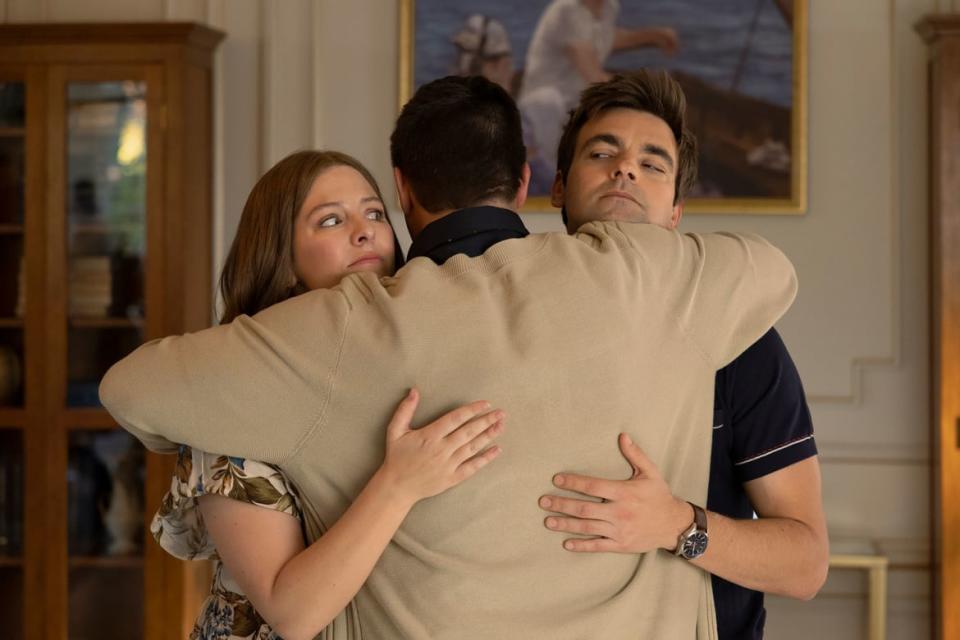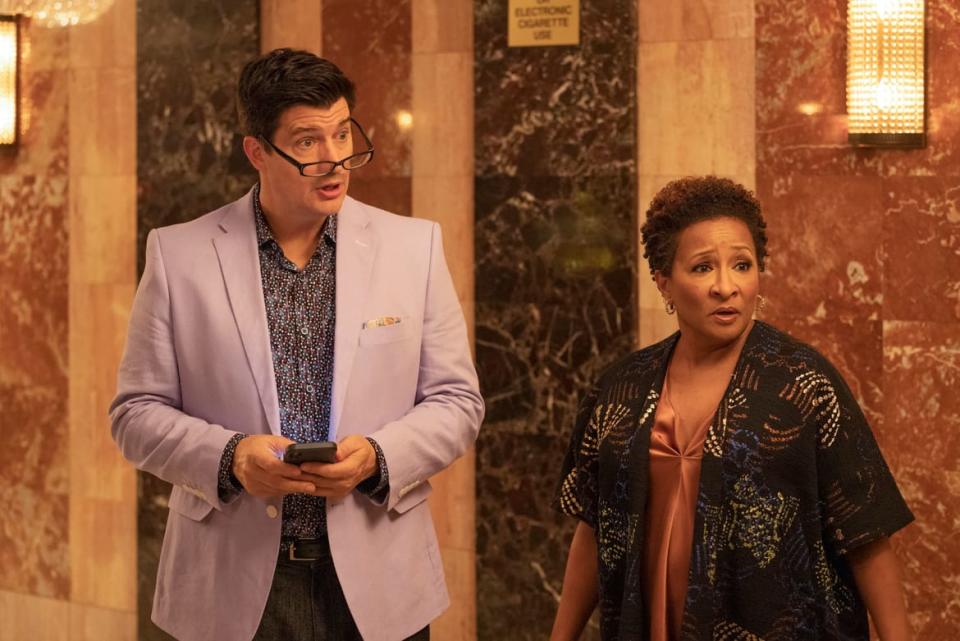This month, viewers have been tuning into HBO to see a family of power-hungry, morally questionable white people plot and scheme their way through the world of media in New York City. Helicopters fly these characters to Long Island mansions with screening rooms. Some of the most nail-biting scenes occur at swanky garden parties or around corporate boardroom tables. The head of the family is a billionaire media mogul who loves their kids even though, to be frank, they are not serious people.
Forget Succession; I’m talking about The Other Two, the hilarious HBO comedy which returned this month for a glorious third season.
No other show currently on air is doing satire as well as The Other Two. Not only is the series the most shriek-inducing representation of gay culture on television, it has also quietly become the most authentic, biting exploration (and takedown) of the current state of media, Hollywood, and the entertainment industry writ large.
This season, that includes hysterical plotlines skewering Disney and Hallmark for their self-congratulatory morsels of LGBTQ representation (one holiday movie is simply called “Christmas But With Gay People”), the drab and meaningless content churned out as most lifestyle programming (including the fake TV shows “Drape Disaster with Maria Menounos” and “Junk Drawer Rehab with David Archuleta”), and the coldhearted commercialization of a teen pop star’s sex appeal (namely, his armpit).
The Secrets of ‘The Other Two’: The Show Everyone You Know (With Taste) Keeps Saying Is So Funny
At one point in the season’s premiere episode, The Other Two even bites the hand that feeds it, mocking the notoriously glitchy HBO Max app. In another episode, it makes two jokes at the expense of Ellen DeGeneres’s reputation, while most shows would probably not be brave enough to make one. “Ellen is throwing herself a big birthday bash and has agreed not to go so people can enjoy it,” says recording industry exec Shuli (Wanda Sykes). Brutal.
But it’s not just industry in-jokes or big name parodies; the show’s satire also gets dark. The Other Two nails the feelings of existential crisis that can come with working in an industry where success is never entirely dependent on hard work or talent, and where the mere prospect of catching a break might lead you to act in mortifyingly embarrassing ways.

That’s because rather than giving us the top-down view of the Roy family, who play chess with entire news networks and movie studios, The Other Two gets in the muddy trenches with the pawns fighting for their lives as they wade through the shitty, soul-crushing reality of show business.
It’s a world where friends compete with one another for scraps of parts that have been lazily rewritten from straight women to gay male characters. A world where you might willingly agree to partner with BrooklynBurrito.com (“The Rolling Stone of websites about burrito spots in Brooklyn”) in exchange for a morsel of publicity that might help your career.
Indeed, if the reality of American politics is closer to Veep than it is to The West Wing, then the media industry is way more The Other Two than it is Succession.
Case Walker and His Sexy Armpit Grow Up on ‘The Other Two’
It’s fitting to talk about the media and entertainment industries together here because, as The Other Two knows, the symbiosis between the two means one can’t exist without the other. Publicity is the lifeblood that fuses and powers them, creating a human centipede of never-ending content. (Take my word for it, I used to guest host some of the popcorn social media shows The Other Two parodies with bits like “The Gay Minute” and “Bagel Bites TV”).
“I was deformed every morning from the industry,” says guest star Kate Berlant, reprising her iconic character from Season 1 who has since had a spiritual awakening during the pandemic. “Why? What did it give me? It only took. It only took. It only takes.”
At this point in the series, siblings Cary (Drew Tarver) and Brooke Dubek (Heléne York) have each tasted a modicum of career success, but if anything, that has only left them emptier and more lost than ever.
Cary, in particular, now seems to be sliding into concerning mental health territory as he becomes all consumed by a need to get more press or book another role. It’s evidently not about his art, either, but the validation it brings him, as well as the chance to measure himself against his friends.
In the premiere, we see him work almost pathologically to ensure his new movie gets a screening—not so his loved ones can watch his art, but so that he can watch them watching it. When that sugar rush of attention finally ends, he sits silently in his dark bedroom scrolling Twitter for mentions of his name. Later, he posts so frequently about the movie on Instagram that friends mute him and his mother stages an intervention.
“No part of making it was how I thought it would be,” Cary says of the movie, “but I figured at least when it came out I would get to watch people watch it and then hear them tell me how good it was and how proud of me they were, and, I don’t know, maybe they’d even stand up and chant my name in unison.”
‘The Other Two’ Star Josh Segarra Is the Reigning King of Hot Idiots
Cary’s addiction later causes tension in his relationship with best friend Curtis (the brilliant Brandon Scott Jones, who thankfully has a much bigger role this season) as the two compete for the same roles. That’s because Cary understands another dark quirk of showbiz and its limited opportunities: your success can often come at the expense of my failure.
Brooke, too, has been warped by the industry, but at least has more self-awareness than her brother to see how unfulfilled she is in her career as a talent manager after the pandemic. “What we both do is nothing,” she tells colleague Streeter (Ken Marino) after the pair drive across the country to securely deliver a photo of the armpit of younger brother/pop star Chase Dreams (Case Walker) for a magazine cover. “What we do is fucking nothing!”
And while Dubek matriarch Pat (Molly Shannon) has now climbed the furthest in showbiz, becoming an Oprah-style entertainment and lifestyle magnate, it’s come at a heavy price. To deal with a public and industry that makes demands of her constantly, she’s effectively kept prisoner by a security team in her mansion. She may be one of the most powerful people in culture, but she’s become effectively removed from it.

“I just feel like I can’t be in the world anymore,” Pat says tearfully in a late season episode. “Like I’ve ruined my life.”
She may well have. If The Other Two’s first season saw the Dubek family suddenly thrust into the showbiz industry, and its second saw them hustling and navigating through it to take advantage of its opportunities, this third dares to ask, ‘What is any of it for?’
Stripped of the glamor (that only some get to enjoy) and of the art (which, as we’re constantly reminded on The Other Two, always comes second to profit), there’s a shockingly empty void at the core of the entertainment industry.
If you’re lucky, like the Dubeks, you have family and friends to give your life meaning, keep you stable, and tell you when your social media presence has become insufferable.
‘The Other Two’ Returns to Brutally (and Hilariously) Satirize Hollywood
Ultimately, that may be what The Other Two gets most right about showbiz: at the end of the day, it’s a job like any other. If you’re looking for contentment through work, you’ll never be satisfied. Your job doesn’t care about you; your loved ones do.
That’s why the cast and crew of Emily Overruled, the drab legal procedural on which Cary guest stars in the fourth episode, might actually have figured it out best. Sure, it’s a low stakes and low effort job, and it might sap you of any colorful creative challenge. But, hey, as they’ll all cheerily tell you: they’re out by 5.
Keep obsessing! Sign up for the Daily Beast’s Obsessed newsletter and follow us on Facebook, Twitter, Instagram and TikTok.
Get the Daily Beast’s biggest scoops and scandals delivered right to your inbox. Sign up now.
Stay informed and gain unlimited access to the Daily Beast’s unmatched reporting. Subscribe now.




